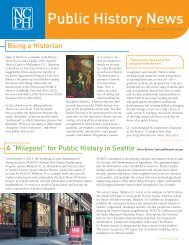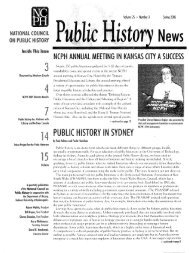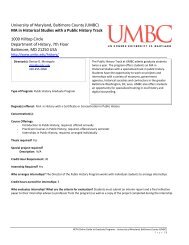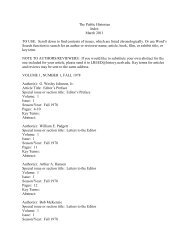Case Statement - National Council on Public History
Case Statement - National Council on Public History
Case Statement - National Council on Public History
You also want an ePaper? Increase the reach of your titles
YUMPU automatically turns print PDFs into web optimized ePapers that Google loves.
Jordan Grant<br />
NCPH-2013, WG<br />
Teaching DH&NM<br />
My name is Jordan Grant. I'm a fourth-year Ph.D. candidate at American University in<br />
Washingt<strong>on</strong>, D.C. At American, I combine my research <strong>on</strong> antebellum slavery and capitalism with<br />
my work as a researcher and de facto "web master" for the <str<strong>on</strong>g>Nati<strong>on</strong>al</str<strong>on</strong>g> Museum of American <strong>History</strong>'s<br />
upcoming exhibiti<strong>on</strong>, American Enterprise. I was fortunate enough to take an introductory digital<br />
history course (taught by the talented Jeremy Boggs) a year into my degree, and I have been<br />
educating myself in the digital humanities [DH] ever since. Although I've worked <strong>on</strong> a number of<br />
digital history projects and attended my fair share of THATCamps and other institutes, I still see<br />
myself as a novice in this field, and I apologize in advance if any of my statements sound parochial<br />
or short-sighted.<br />
I write from the perspective that the primary goal of public history educators training their<br />
students in DH should be a job – more specifically, a productive career dealing with the past, inside<br />
or outside academia. Although treating our graduate training as simply a form of job-training may<br />
go against the spirit of the humanities, I do it here because it tightens our focus, pushing us to<br />
grapple with the very real –and often stark– c<strong>on</strong>diti<strong>on</strong>s degree-seekers will face when they leave<br />
our public history programs and begin making careers out in the world.<br />
What kinds of DH-inflected jobs are out there? Most of my work has revolved around DCbased<br />
museums. Within that ecological niche of cultural instituti<strong>on</strong>s, I've come across three<br />
varieties of DH-workers. The first are social media gurus, people highly trained in creating new<br />
media and sharing it strategically with their instituti<strong>on</strong>s' networks of stakeholders. Virtually every<br />
department needs this kind of pers<strong>on</strong>, even if social media is just <strong>on</strong>e aspect of their many duties.<br />
The sec<strong>on</strong>d group c<strong>on</strong>tains both web designers and web developers. Located outside the actual IT<br />
department of the museum, these men and women can sling code and work in Adobe; they actually<br />
build the websites, apps, and tools that increasingly serve as the fr<strong>on</strong>t-line of our instituti<strong>on</strong>s'<br />
outreach. The final group, collecti<strong>on</strong>s managers, supplement the very well-established practices of<br />
archival science and folks<strong>on</strong>omy with a clear-eyed understanding of APIs and Open Linked Data,<br />
preparing their instituti<strong>on</strong>s for new kinds of interacti<strong>on</strong>s with the public <strong>on</strong> the open web.<br />
While these three positi<strong>on</strong>s are just a brief sample of the kinds of jobs DH-trained public<br />
historians could aspire to, they're a useful starting point for a discussi<strong>on</strong> of what should be taught<br />
in graduate schools. All of these positi<strong>on</strong>s will be vital to the future of our cultural instituti<strong>on</strong>s, but<br />
they all call for knowledge and skills that, at the moment, most public history programs are illsuited<br />
to provide. In my experience, the average program's digital history course is a twelve-tofourteen<br />
week tour through DH's greatest hits. Although students often finish the class with a better<br />
handle <strong>on</strong> the history of the field and some new skills, they have little time to develop the technical<br />
proficiencies they need to actually do innovative work. How many universities have a DH center, or<br />
even a resident digital humanist, who could explain how to build a website using Ruby <strong>on</strong> Rails or<br />
Twitter's Bootstrap? How many have some<strong>on</strong>e who has led a targeted publicity campaign using<br />
Facebook, or has cleaned up collecti<strong>on</strong> data using Google Refine? Although DH may be currently














